Why China's slowdown matters
- Published
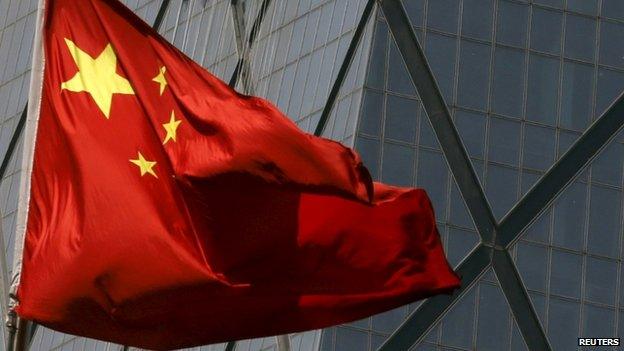
After a long period of stunning growth, China's economy is now slowing.
The economy grew at an average rate of 10% a year for the three decades up to 2010.
It has slowed markedly. Last year, the Chinese economy grew 7.4%. The International Monetary Fund (IMF)'s most recent forecast, external is 6.8% for this year and 6.3% for 2016.
So why is this significant?

Why is China's economy slowing?
The government wanted a slowdown, and has encouraged it because there are long-term forces that mean it was inevitable sooner or later.
Better, if possible, to have a gentle slowdown - called a "soft landing" - than a disruptive one.
More fully, China's very fast economic growth was based on some factors that could not last forever.
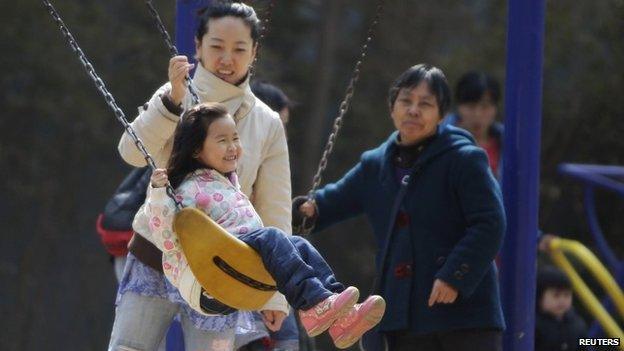
Could China's "one child" policy lead to labour shortages in the future?
Very high levels of investment have been part of the story.
Last year, the figure was 48% of economic activity, or gross domestic product (GDP), according to IMF data.
There are only a few other economies where the figure is so high.
Most are in the 15-30% range.
Investment is certainly essential for improving the capacity of the economy for the future.
High investment rates have been important factors in other Asian economic success stories.
But you can have too much of a good thing.
There is always a risk with large-scale investment that some projects will be uneconomic.
It can lead to instability in property prices if there is heavy investment in construction, and there have been persistent concerns about whether China might have a property market crash.
So the government's aim is to get spending by Chinese consumers to take a bigger role in driving the economy, and it has the support of, for example, the IMF in that.
A research paper from the IMF, external concluded in 2012 that Chinese investment was too high.
There is also a limit to the supply of new workers moving from the countryside.
The IMF has warned that China could instead increasingly face labour shortages, external, partly as a result of the country's "one child" policy.

What has happened to China's exports?
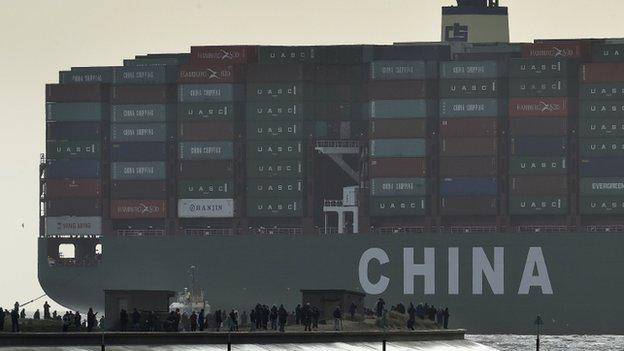
The level of China's exports has been politically controversial
Exports of cheaply made goods have been central to China's stunning growth.
From the turn of the century to 2011, there were only two years when China's exports did not grow by more than 10% and there were six years when it was more than 20%.
The exceptions were 2008 and 2009, when China's markets in the West were reeling from the financial crisis.
Since 2011, the export growth figures have been more modest, slowing to 6.4% last year.
China's export performance has been politically contentious, especially in the United States.
Some research, external has found evidence to support the idea that employment and pay rates have been affected in American industries exposed to increased competition from China.
Sometimes the balance between China's exports and imports has been taken by some as an indication of the country's growing challenge to the manufacturing industry in the developed nations.
Taking a slightly wider measure - the current account surplus, which you get by deducting imports from exports and adding in some financial transactions - that has moderated.
This is a measure of China's transactions with the entire rest of the world, not any specific country.
As a share of China's GDP, this surplus peaked at 10% in 2007 and last year was 2%.
It is still large in cash terms, however, at more than $200bn (£135bn).

What has been the impact on the rest of us?
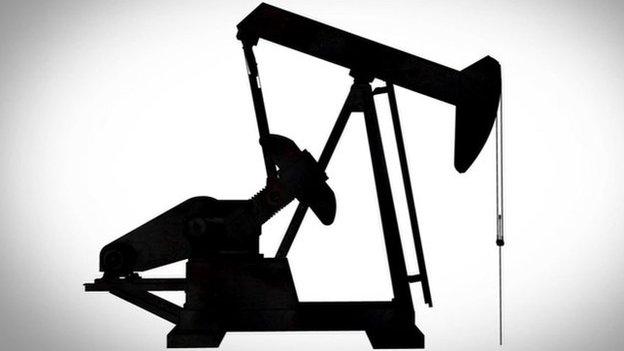
China's economic slowdown has meant lower demand for oil
China also imports a lot, which is one reason why its slowdown matters to the rest of the world.
China is the second biggest importer, external of both goods and commercial services.
It is the biggest export destination for Thailand, and comes in second place for Indonesia, South Africa, Brazil and Japan (and for the last two, it is not far off first place).
For the European Union, China comes in third. And for the UK and the US, it is number four. (These are World Trade Organization figures, external, which treat the European Union as a single export destination.)
China has an important role as a buyer of oil and other commodities, and the slowdown has been a factor in the decline in the prices of those goods.
So even if China's more moderate growth is a good thing in the long term, it has had an adverse impact on some countries, especially commodity exporters.
There is also the possibility of financial instability spreading from China.
Since the financial crisis, debt in China has grown rapidly.
A recent IMF report specifically expressed concern about the property market, external and how it might affect companies that had lent to that business.
It said: : "In China, exposures to real estate (excluding mortgages) are almost 20% of GDP, and financial stress among real estate firms could lead to direct cross-border spillovers."

Exactly how big is China's economy?
Depending on how you crunch the numbers, it is either the biggest or second biggest on the planet.
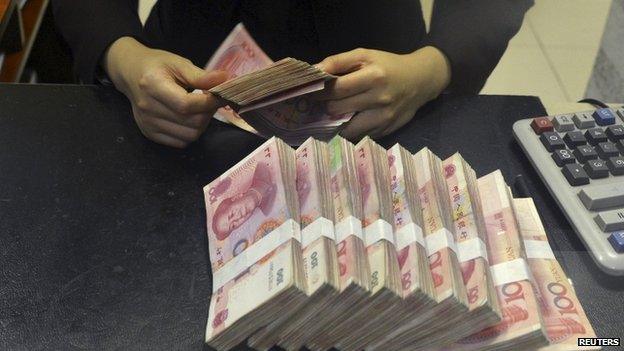
China's economy is worth about $10 trillion, on one measure
There are two answers because to compare economies, you need to convert the numbers into a common currency.
Usually, it is the dollar, and there are two ways that economists do it.
One is taking actual exchange rates; the other uses a method called purchasing power parity (PPP), external, which makes allowances for differences in price levels.
As of last year, China overtook the US on the PPP basis, though it still lags on the exchange-rate measure.
On the latter basis, China's economy is worth about $10 trillion (nearly £7tn).
The figures for the other large economies are $17.4tn for the US, $4.6tn for Japan, Germany close to $4tn and the UK very nearly $3tn.
In per capita terms - which gives a rough and ready indication of what has happened to living standards - China advanced by 1,300% from 1980 to 2010.
It is worth emphasising that, in those terms, China is still a long way adrift of the rich countries.
Its GDP is very large, but so is the population.
Using the PPP basis, China's GDP per person is a quarter of the US level and a third of the UK's.
The gap is, however, narrowing.

Has President Xi Jinping's fight against corruption had an impact on China's economic performance?
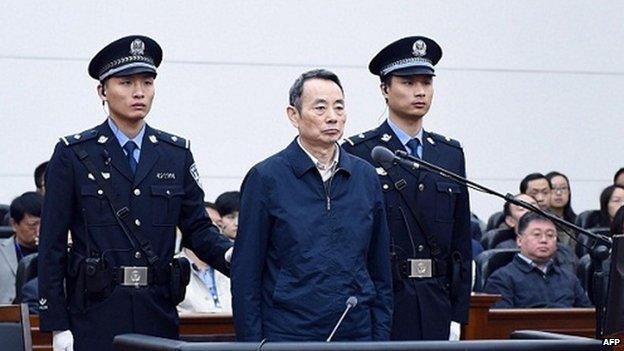
Former chairman of China National Petroleum Corp Jiang Jiemin is one of the highest ranking figures to fall in the country's much-publicised anti-corruption drive
A report from Bank of America Merrill Lynch suggested that fears of being accused of taking bribes had left Chinese officials very reluctant to approve public investment projects.
There have also been suggestions that there has been an impact on hotels and restaurants.
But even if there has been a short-term impact, there is a widely held view among economists that corruption has negative long-term effects.
The title of a World Bank research paper (back in 1999) put the question rather neatly: "Corruption in Economic Development: Beneficial Grease, Minor Annoyance, or Major Obstacle?", external
The conclusion was that it was a major obstacle.
It encourages excess public spending, and distorts the way it is used, shifting it from health and education towards less efficient public projects.
It also deters private investment - though insufficient investment is not currently China's problem.

What should we look out for in the next few months?
There will be data from the Chinese authorities every three months.
We have had the figures for the first quarter of 2015, external, which showed growth of 7% compared with a year earlier and 1.3% from the previous quarter.
There is quite a lot of scepticism about the reliability of these official figures.
Diana Choyleva, of Lombard Street Research, external, thinks Chinese GDP actually declined in the first three months of the year.
China's slowdown will be a major issue hanging over the big international economic policy events of the year: the G20 summit in Turkey in November and the annual meetings of the IMF in October, this year being held in Peru.
It is unlikely, however, that these gatherings will do very much about it.
For sure, China's slowdown will be a key feature of the global economic landscape for several years and will affect the rest of us.
But it is generally seen as inevitable, a fact of life that the rest of the word can adapt to - just as long as China does achieve that much desired soft landing.
- Published15 April 2015
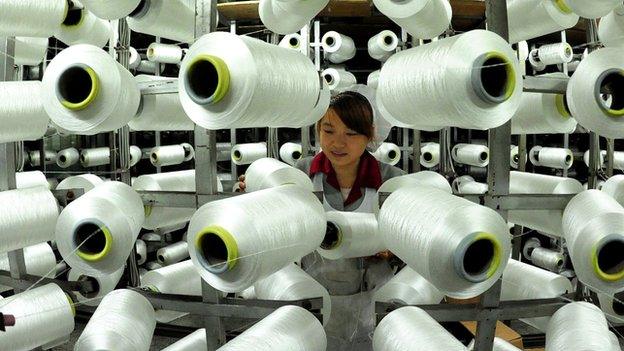
- Published20 April 2015
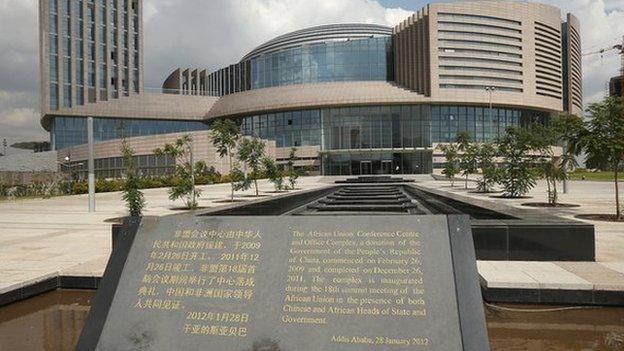
- Published20 April 2015
